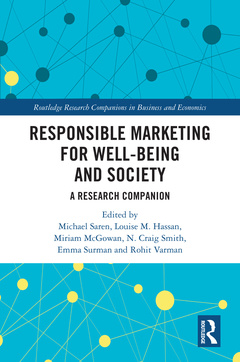Description
Responsible Marketing for Well-being and Society
A Research Companion
Routledge Research Companions in Business and Economics Series
Language: English
Subjects for Responsible Marketing for Well-being and Society:
· 15.6x23.4 cm · Hardback
Description
/li>Contents
/li>Readership
/li>Biography
/li>
This book provides an overview of recent and current research which defines and scopes the field of responsible marketing in one single edited book. It brings together diverse perspectives from contributors at Birmingham University, leading the academic development of knowledge of the subject, to contribute to the learning curriculum and reach out to those interested in improving marketing practices and standards. Responsible Marketing for Well-being and Society draws together a rich and diverse body of scholarly research from a variety of perspectives from individual to global, macro and micro, producer and consumer, environmental, stakeholder, supply chain, and other intermediary viewpoints. The embryonic research in this field involves different philosophical and methodological positions, theoretical approaches, and research communities including aspects of corporate social responsibility, marketing ethics, critical marketing, consumer culture theory, and macromarketing.
The book takes a predominantly organisational or enterprise-level perspective in order to understand and explain how individuals and organisations can manage their marketing activities and relationships responsibly. The actions of other stakeholders are also a crucial component in achieving responsible outcomes; therefore, a broader perspective on the impacts of marketing decisions and actions on other stakeholders, such as consumers, employees, the environment, and society, is also taken as a basis for analysis and discussion. The book provides an authoritative overview for the academic market, including university libraries, research teams, PhD students, and independent researchers.
The topics and contents of responsible marketing are relevant to several disciplinary fields of study including, marketing, advertising, retailing and other business subjects, consumer studies, sustainability, ethics, public policy, media studies, psychology, economics, and other social sciences.
Editors
Contributors
1. Introduction: Responsible Marketing
Michael Saren, Louise Hassan, Miriam McGowan, N. Craig Smith, Emma Surman, and Rohit Varman
Section 1: Encouraging and Challenging Responsible Consumption
2. Environmentally sustainable spillover effects
Megan Burnett
3. Experience of a self-control conflict: A key to unlock the exertion of self-control effort in sustainable consumption
Ngoc T H Nguyen and Louise Hassan
4. Is it irresponsible to responsibly market alcohol?: The role of corporate social responsibility in the UK alcohol industry
Isabelle Szmigin
5. Responsible marketing and consumption starts with changing mindsets: How educators can embed responsible marketing and consumption into curricula
Sarah Montano and Inci Toral Manson
Section 2: Promoting Marketing Care, Access and Diversity
6. Broken Promises: A day in the life of a carer
Leighanne Higgins and Killian O’Leary
7. Film and the marketplace exclusion of aging female sexuality: A critical feminist review
Julie Whiteman
8. Toward a broadened understanding of care, markets and consumption
Andreas Chatzidakis
9. Swapping food and cultivating care at community food swaps
Emma Surman
Section 3: Marketing Responsibility and Technology
10. Responsible technology in marketing: Theory, adoption, practice
Robert Cluley and William Green
11. Imagining responsible marketing in the digital economy: Why it is easier to think about AI overloads than digital marketing as a source of freedom
Mike Molesworth, Iris Hong-Bich Truong and Georgiana Grigore
12. When responsibility fails: The case of Facebook/Meta’s response to the Cambridge Analytica data scandal
Hazel Westwood
13. Responsible marketing in a time of culture war
Ken Peattie
Section 4: Marketing Ethics and Sustainability
14. On justification: Exploring the controversies and sensemaking of the ethical tourist
Solon Magrizos
15. Ready meals’ and dinner meal deals’ contribution to overconsumption: Using social marketing and the intervention ladder models to examine actions
Sheena Leek and Daniel Afoakwah
16. CSR halo and perceptions of company CSR programs
Sofia López-Rodríguez, N. Craig Smith and Daniel Read
17. The need for responsible film marketing
Finola Kerrigan
Section 5: Critical Perspectives on Marketing and Society
18. Postcolonialism, subalternity, and critical marketing
Rohit Varman
19. Identity-in-creation: Breaking the mould of identity projects
Pilar Rojas-Gaviria
20. Regimes of visibility: Unravelling media, conflict, and hegemony in place branding processes
Alessandro Gerosa
21. Double movement, sociality and resistance in markets
Rohit Varman
Section 6: Concluding Chapter
22. Striving to be and market a “responsible” business school
Catherine Cassell, Caroline Moraes, and Emily Muscat-Sharp
Michael Saren is a Professor of Marketing at Birmingham Business School, University of Birmingham. He is also an Emeritus Professor at Leicester University, where he was head of the marketing division 2004–2014. He was previously a Professor of Marketing at Strathclyde University and an Honorary Professor at St Andrews University. He has been a member of the academic senate of the Chartered Institute of Marketing, the executive committee of EMAC, and was awarded an honorary fellowship and lifetime membership of the UK Academy of Marketing.
Louise M. Hassan (蕭永真) is an Associate Professor in Marketing at Birmingham Business School. She was previously a Professor of Consumer Psychology at Bangor Business School (2015–2021). Her research interests focus on responsible consumption. In particular, she is interested in understanding psychological processes underlying consumption decisions.
Miriam McGowan is a Lecturer in Marketing at the University of Birmingham. Her research draws on a consumer psychology perspective to understand consumer decision-making and the role of emotions. Miriam is interested in how peoples’ behaviours can be changed for good, such as by encouraging pro-social and pro-environmental choices.
N. Craig Smith is the INSEAD Chaired Professor of Ethics and Social Responsibility at INSEAD in Fontainebleau, France, and Visiting Professor in Marketing at the University of Birmingham Business School. His research is at the intersection of business and society, encompassing business ethics, corporate social responsibility, and sustainability.
Emma Surman is a Senior Lecturer/Associate Professor at the Birmingham Business School, University of Birmingham, UK. Her research falls broadly within the areas of consumer culture, critical marketing, sociology of consumption and ethics, and sustainability in relation to consumer practices.
Rohit Varman is a Professor at Birmingham




